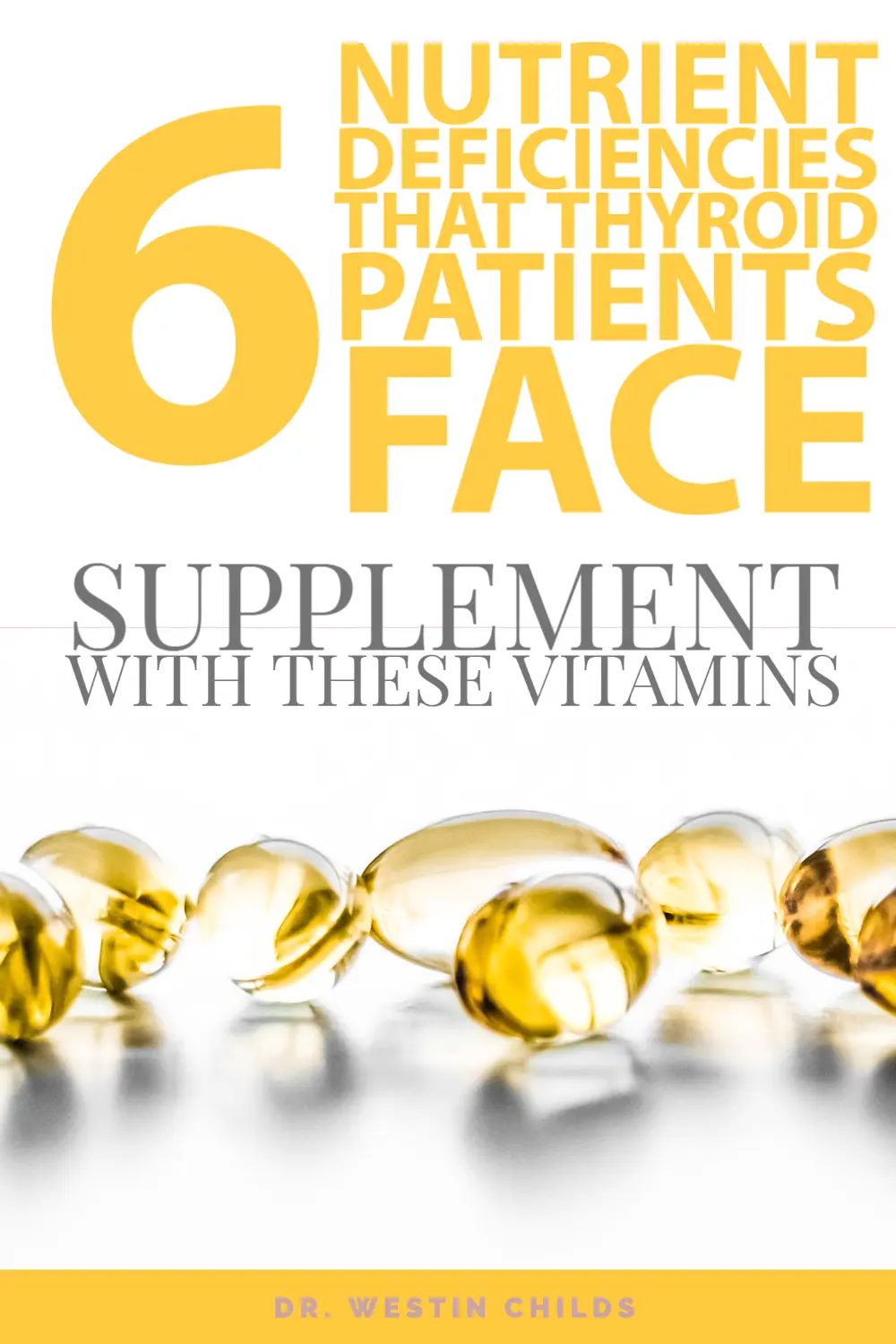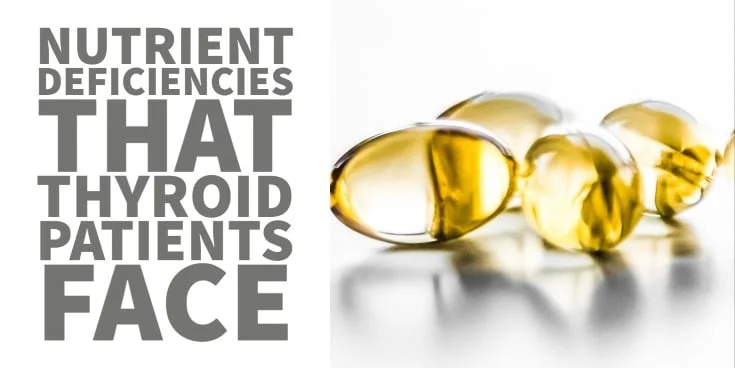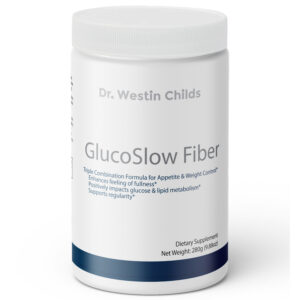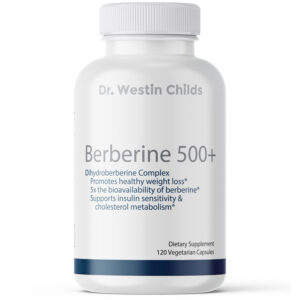Nutrients can and do impact your thyroid!
As a thyroid patient, you should be aware that certain nutrient deficiencies can and do impact your thyroid.
What does this mean for you?
It means that these nutrient deficiencies are a way that YOU can both naturally treat AND improve your thyroid.
And this is great news for any thyroid patient simply because most therapies available to you require a doctor’s prescription pad.
But this isn’t true for supplements because they are available over the counter!
Which supplements you should use (and which actually benefit your thyroid) is another story entirely.
And that’s exactly what we are going to talk about today.
These nutrient deficiencies are important because nearly EVERY thyroid patient struggle with one or more of those listed below (we will get to the list in a second).
And these nutrients negatively affect both your thyroid gland itself and OTHER areas of your body (other organs and tissues).
Ultimately, this leads to hypothyroid symptoms such as weight gain, depression, cold intolerance, fatigue, hair loss, and so on.
Why do these occur?
Because these nutrient deficiencies impact certain areas of thyroid function including:
- Thyroid hormone conversion (T4 to T3 conversion)
- Thyroid hormone production (direct production of thyroid hormone from the thyroid gland)
- Peripheral utilization of thyroid hormone (even if thyroid hormone is available for use it doesn’t mean your body CAN use it)
- And more…
Let’s talk about these nutrient deficiencies in detail so you can better understand what to look for.
Which ones are common?
The reason is simple:
The standard American lifestyle (which is being adopted by other countries as well) lends itself to MULTIPLE nutrient deficiencies (1).
When you combine this with the fact that low thyroid function does the VERY same thing, you have a setup for nutrient deficiencies that nearly all thyroid patients face.
And when I talk about nutrient deficiencies I am not talking about full-blown nutrient deficiencies.
Most doctors (and some people) get this wrong.
They believe that nutrient deficiencies MUST be full-blown otherwise they simply don’t exist.
And this is a huge error.
You shouldn’t consider nutrient deficiencies as either present or not, instead, you should consider nutrient deficiencies on a spectrum.
On one side you have full-blown deficiencies (this is what most doctors are looking for) and on the other side, you have minor to sub-clinical deficiencies (this is what YOU should be looking for).
These subclinical nutrient deficiencies are more sinister because they are often missed by doctors but they still cause quality-of-life symptoms and issues.
For this list, we are going to be focusing on these minor to moderate deficiencies.
DOWNLOAD FREE RESOURCES
Foods to Avoid if you Have Thyroid Problems:
I’ve found that these 10 foods cause the most problems for thyroid patients. Learn which foods you should avoid if you have thyroid disease of any type.
The Complete List of Thyroid Lab tests:
The list includes optimal ranges, normal ranges, and the complete list of tests you need to diagnose and manage thyroid disease correctly!
#1. Vitamin B12.
B12 is probably one of the most common (and most important) deficiencies that thyroid patients face.
It’s also probably one of the most important.
Why?
Because the symptoms of Vitamin B12 deficiency can mimic those of hypothyroidism.
Low B12 leads to symptoms like hair loss, depression, low energy, and even weight gain.
Do these symptoms sound familiar?
They should because they are basically identical to those symptoms found in hypothyroidism.
This makes differentiated Vitamin b12 deficiency difficult from hypothyroid symptoms.
And B12 deficiency is VERY common among thyroid patients.
The reason has to do with the fact that B12 is somewhat of a wimpy nutrient in the sense that so many things can disrupt it from getting into your body.
Not only that but it’s also hard for the body to utilize if it’s not in the right form or if you have an MTHFR defect in your body.
In fact, one of the main causes of B12 deficiency is low stomach acid.
And low stomach acid is caused directly by low thyroid function.
So low thyroid function can lead to B12 deficiency due to malabsorption which in turn can cause symptoms that mimic hypothyroidism.
To make matters worse, once you replace thyroid hormone (assuming you take the right dose of thyroid medication) it doesn’t fix your low B12 problem.
To do that you MUST take Vitamin B12.
If you are a thyroid patient (and this means anyone with hypothyroidism, Hashimoto’s thyroiditis, or those without a thyroid) then you should consider supplementing with vitamin b12.
I would recommend using pre-methylated B vitamins (to ensure that it is safe with ANY MTHFR genetic mutations (2)) so that your body can utilize them as soon as possible.
You can get B12 in the proper form, and with other essential B vitamins, in my recommended product here.
You may also find that you need to use B12 shots over oral B12 supplements so just keep that in the back of your head.
#2. Vitamin D.
Next on the list is Vitamin D.
Vitamin D is incredibly important for both thyroid function and other functions in the body.
There is a direct relationship between Vitamin D deficiency and certain thyroid disorders.
For instance:
Vitamin D deficiency increases your risk of developing Hashimoto’s thyroiditis (and other autoimmune diseases) while simultaneously increasing your risk of thyroid cancer (3).
The good news about Vitamin D deficiency is that you can easily test for it and easily supplement for low levels.
The bad news is that pretty much everyone I’ve ever tested (excluding those already taking Vitamin D) has Vitamin D deficiency.
This is because we don’t get out in the sunlight enough to activate Vitamin D levels in our bodies.
In order for this to happen, you need at least 40% of your skin exposed to sunlight and there can’t be any clouds in the sky and you can’t be wearing any sunblock.
The conditions are such that this rarely happens for most of us so something like 2 billion people around the world (4) are Vitamin D deficient. Taking Vitamin D can help to both improve your immune system and thyroid function.
It can also be used as a treatment for Hashimoto’s thyroiditis (thyroid autoimmune disease).
You’ll want to titrate your dose to whatever your body needs but most people will need somewhere around 2,000 IU to 5,000 IU.
Rarely, some people need doses as high as 10,000 IU per day as well.
If you decide to supplement with Vitamin D make sure you use a liquid Vitamin D in a fat-soluble substance to enhance absorption when you take it.
Placing Vitamin D in a micellized matrix also helps with absorption.
I recommend using a supplement such as this one which meets all of the criteria listed above.
#3. Zinc + Selenium.
I’ve included both zinc and selenium together for this section (even though they are each very important on their own) because they do help do one very important thing. And that thing helps your thyroid convert T4 to T3.
This conversion process is the thing that helps your thyroid actually work and both zinc and selenium are involved in this process.
Low levels of either Zinc or Selenium can limit this conversion process and lead to problems such as low T3 levels.
If you don’t already know, T3 is the single most important thyroid hormone in your body.
This effect is so profound that Zinc deficiency by itself can decrease thyroid function to a noticeable level.
Some studies show that replacing Zinc levels improves thyroid lab tests in those who are deficient.
This isn’t their only benefit, though, as they also play important roles in other systems in the body.
Zinc, for instance, plays an important role in regulating your immune system.

Taking zinc can be used as a therapy for treating Hashimoto’s thyroiditis by balancing immune function.
Selenium, on the other hand, is required for the production of the master antioxidant known as glutathione.
If you are selenium deficient then you may find that you are much more likely to develop localized inflammation directly in your thyroid gland.
This inflammation can lead to damage to the thyroid gland from thyroid autoimmunity and is one of the reasons that Selenium can be used to help lower thyroid antibodies.
We also know that MANY thyroid patients are both zinc and selenium deficient (meaning they don’t have enough of these nutrients).
This means that supplementing with both Zinc and Selenium provides a unique opportunity to help your thyroid at several levels.
Using the right dose is very important, however, because using too much can actually be harmful.
I recommend doses of Zinc in the 10-15mg per day range and doses of Selenium in the 75-150 mcg per day range.
You will also want to take them together for the best results.
You can take them together (along with other important thyroid nutrients) in a supplement such as this one.
#4. Iodine.
There is so much confusion out there about iodine that we simply can’t skip over it. No matter how you look at it, iodine is an ESSENTIAL nutrient for your thyroid. If you don’t have enough iodine then you won’t be able to produce thyroid hormone. Period. Iodine forms the backbone of thyroid hormone and it’s what your thyroid gland uses to put thyroid hormone together. Low levels of iodine will lead to low levels of thyroid hormone. But here’s the problem:
Many people (thyroid patients in particular) believe that iodine is somehow harmful to their thyroid gland.
They believe that taking iodine will cause issues.
And while there have been some medical studies that show a correlation between iodine intake and thyroid damage, these studies have never proven that one is the cause of the other.
Furthermore, we know that iodine is essential (5)!
If you look at the back of salt that doesn’t have iodine there is a warning about the lack of iodine for this very reason.
And humans lack the capacity to create iodine on their own which means the only way we can get iodine is through our diet.
If you are a human being you should be getting iodine from SOME source.
This is especially true if you have a thyroid problem and that includes those with Hashimoto’s thyroiditis!
If you have Hashimoto’s you can safely take iodine by combining it with Selenium (which protects against thyroid inflammation).
How much you use of iodine is another story entirely and this may be why certain people do poorly on it.
I’ve written about the various doses available for iodine which you can read about here.
You can also find my recommended low-dose iodine supplement here and my recommended moderate to high-dose iodine supplement here.
#5. Magnesium.
Magnesium plays a role in some 300+ processes in the body.
We are interested in magnesium both because of its importance in regulating these processes and also because thyroid hormone levels negatively impact magnesium metabolism.
So patients with thyroid problems tend to have magnesium deficiency issues at a much higher rate compared to those without thyroid levels.
And this discrepancy stems from how the thyroid influences magnesium metabolism.
Magnesium deficiency tends to cause low-grade symptoms which can be difficult to identify in certain people.
There are ways to test for magnesium deficiency in your blood but they are quite inaccurate.
Because of this, it’s often better to simply supplement with magnesium (especially if you never have) if you have any thyroid problems.
Taking a low dose between 100mg to 200mg per day can replete low magnesium levels and help improve your symptoms.
I recommend using a supplement that contains magnesium glycinate as it is easily absorbed and gets into your body quickly.
#6. Iron.
Last but certainly not least is iron.
Healthy iron levels are required for your thyroid to work correctly.
Many thyroid patients run into trouble with low iron because low thyroid causes low iron.
This occurs because of the relationship between iron absorption in the GI tract and thyroid impact on acid-producing stomach cells.
Low thyroid hormone results in decreased iron absorption and therefore low iron.
Low iron causes low thyroid function which further decreases iron absorption and the cycle continues (much like B12 deficiency). What makes this a more sinister problem is how doctors look at and evaluate low iron.
Most doctors really only care about iron deficiency which causes anemia (low red blood cells).
But you can have low iron WITHOUT anemia and this is the condition that negatively impacts your thyroid.
You can catch this condition early (before it causes significant problems) by evaluating your iron studies as well as ferritin.
If you find that your ferritin level is sub-optimal then you will want to take iron to increase it.
But do NOT take iron unless you have a documented deficiency with lab tests.
So make sure you check out this article which explains how to determine if your iron level is optimal before supplementing. Get your iron levels checked if you have thyroid problems!
Final Thoughts
If you have hypothyroidism or Hashimoto’s then you should be very aware of the impact that these nutrient deficiencies have on both your body and your thyroid.
Using supplements is important because it is something that you have control over.
Unlike thyroid medication, you can purchase these supplements over the counter and they can be used to augment whatever existing therapies you are currently using.
And now I want to hear from you:
Do you have any of these nutrient deficiencies?
If so, have you supplemented to try and fix them?
Did supplementing work for you? Did it improve your symptoms or help you feel better?
If so, leave your comment and experience below!










